ANIMAL LEGISLATION AND SOCIETAL ISSUES Part B - Position Paper
VerifiedAdded on 2023/04/23
|14
|4042
|285
AI Summary
Contribute Materials
Your contribution can guide someone’s learning journey. Share your
documents today.
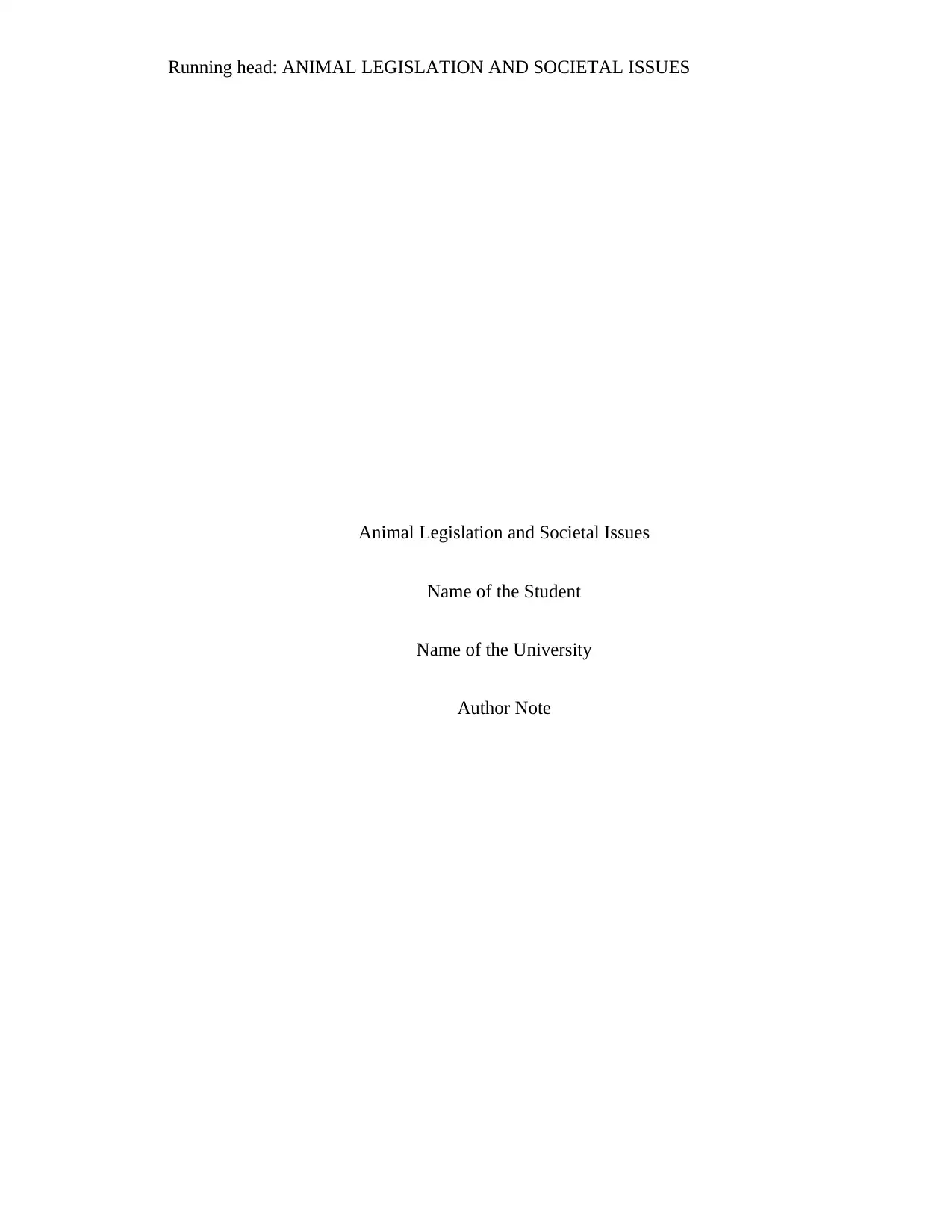
Running head: ANIMAL LEGISLATION AND SOCIETAL ISSUES
Animal Legislation and Societal Issues
Name of the Student
Name of the University
Author Note
Animal Legislation and Societal Issues
Name of the Student
Name of the University
Author Note
Secure Best Marks with AI Grader
Need help grading? Try our AI Grader for instant feedback on your assignments.
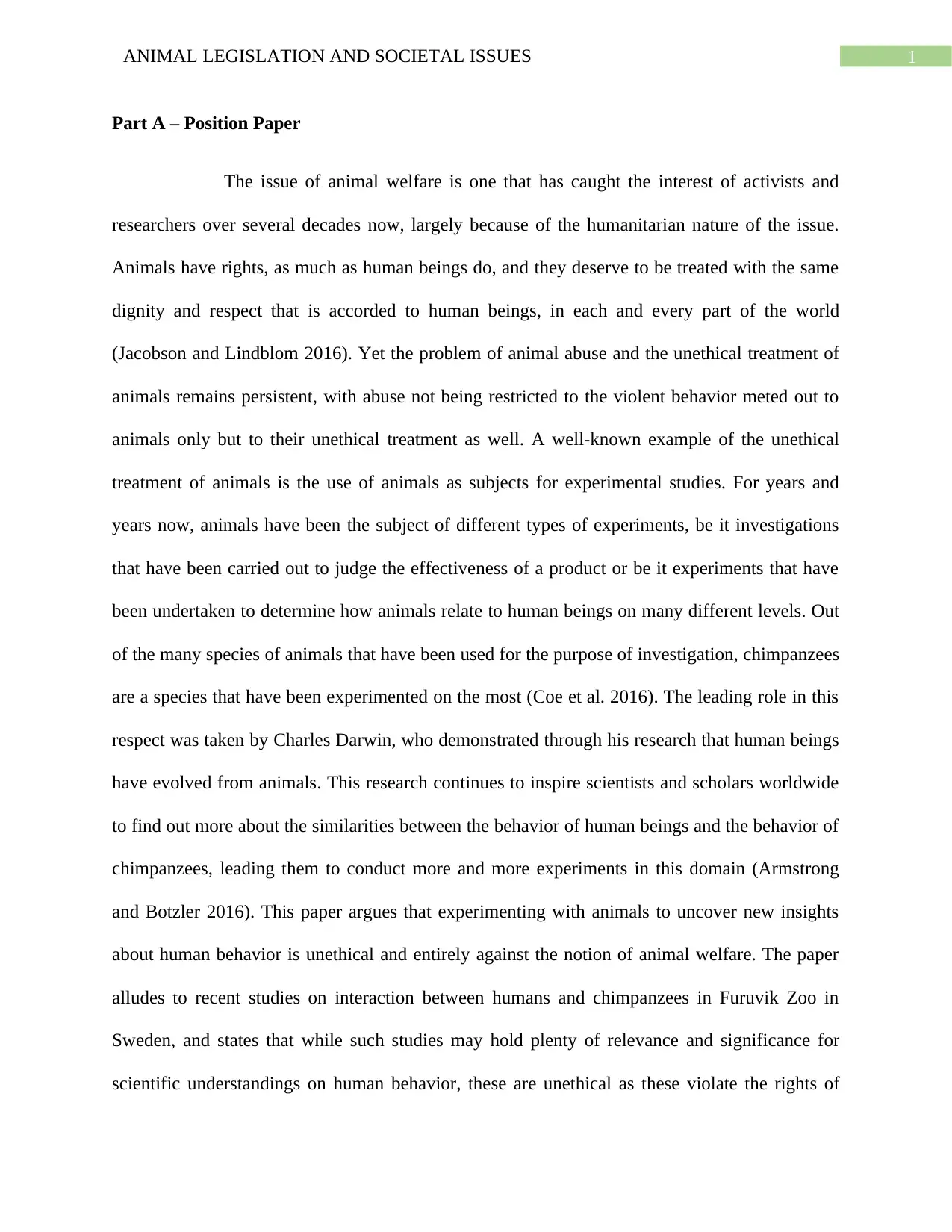
1ANIMAL LEGISLATION AND SOCIETAL ISSUES
Part A – Position Paper
The issue of animal welfare is one that has caught the interest of activists and
researchers over several decades now, largely because of the humanitarian nature of the issue.
Animals have rights, as much as human beings do, and they deserve to be treated with the same
dignity and respect that is accorded to human beings, in each and every part of the world
(Jacobson and Lindblom 2016). Yet the problem of animal abuse and the unethical treatment of
animals remains persistent, with abuse not being restricted to the violent behavior meted out to
animals only but to their unethical treatment as well. A well-known example of the unethical
treatment of animals is the use of animals as subjects for experimental studies. For years and
years now, animals have been the subject of different types of experiments, be it investigations
that have been carried out to judge the effectiveness of a product or be it experiments that have
been undertaken to determine how animals relate to human beings on many different levels. Out
of the many species of animals that have been used for the purpose of investigation, chimpanzees
are a species that have been experimented on the most (Coe et al. 2016). The leading role in this
respect was taken by Charles Darwin, who demonstrated through his research that human beings
have evolved from animals. This research continues to inspire scientists and scholars worldwide
to find out more about the similarities between the behavior of human beings and the behavior of
chimpanzees, leading them to conduct more and more experiments in this domain (Armstrong
and Botzler 2016). This paper argues that experimenting with animals to uncover new insights
about human behavior is unethical and entirely against the notion of animal welfare. The paper
alludes to recent studies on interaction between humans and chimpanzees in Furuvik Zoo in
Sweden, and states that while such studies may hold plenty of relevance and significance for
scientific understandings on human behavior, these are unethical as these violate the rights of
Part A – Position Paper
The issue of animal welfare is one that has caught the interest of activists and
researchers over several decades now, largely because of the humanitarian nature of the issue.
Animals have rights, as much as human beings do, and they deserve to be treated with the same
dignity and respect that is accorded to human beings, in each and every part of the world
(Jacobson and Lindblom 2016). Yet the problem of animal abuse and the unethical treatment of
animals remains persistent, with abuse not being restricted to the violent behavior meted out to
animals only but to their unethical treatment as well. A well-known example of the unethical
treatment of animals is the use of animals as subjects for experimental studies. For years and
years now, animals have been the subject of different types of experiments, be it investigations
that have been carried out to judge the effectiveness of a product or be it experiments that have
been undertaken to determine how animals relate to human beings on many different levels. Out
of the many species of animals that have been used for the purpose of investigation, chimpanzees
are a species that have been experimented on the most (Coe et al. 2016). The leading role in this
respect was taken by Charles Darwin, who demonstrated through his research that human beings
have evolved from animals. This research continues to inspire scientists and scholars worldwide
to find out more about the similarities between the behavior of human beings and the behavior of
chimpanzees, leading them to conduct more and more experiments in this domain (Armstrong
and Botzler 2016). This paper argues that experimenting with animals to uncover new insights
about human behavior is unethical and entirely against the notion of animal welfare. The paper
alludes to recent studies on interaction between humans and chimpanzees in Furuvik Zoo in
Sweden, and states that while such studies may hold plenty of relevance and significance for
scientific understandings on human behavior, these are unethical as these violate the rights of
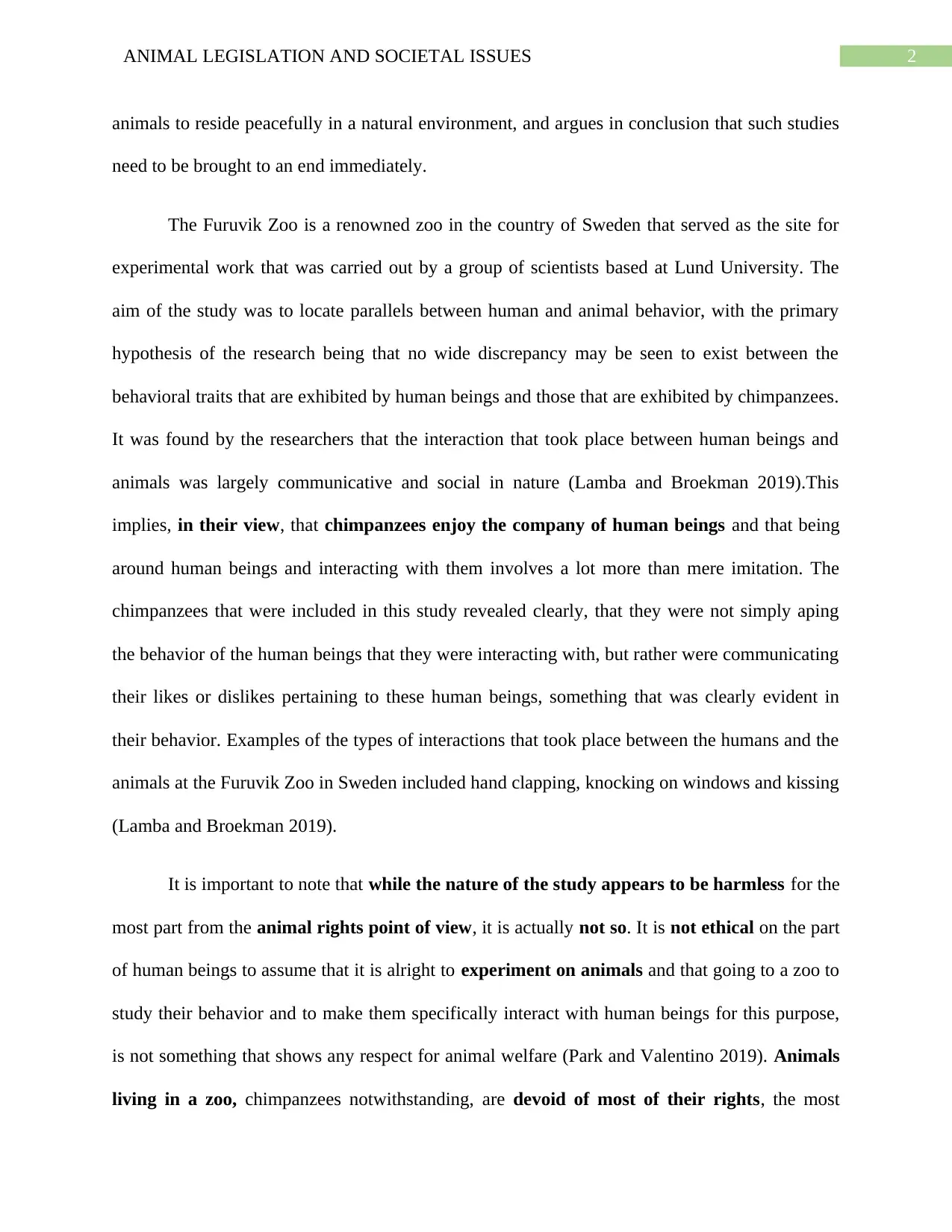
2ANIMAL LEGISLATION AND SOCIETAL ISSUES
animals to reside peacefully in a natural environment, and argues in conclusion that such studies
need to be brought to an end immediately.
The Furuvik Zoo is a renowned zoo in the country of Sweden that served as the site for
experimental work that was carried out by a group of scientists based at Lund University. The
aim of the study was to locate parallels between human and animal behavior, with the primary
hypothesis of the research being that no wide discrepancy may be seen to exist between the
behavioral traits that are exhibited by human beings and those that are exhibited by chimpanzees.
It was found by the researchers that the interaction that took place between human beings and
animals was largely communicative and social in nature (Lamba and Broekman 2019).This
implies, in their view, that chimpanzees enjoy the company of human beings and that being
around human beings and interacting with them involves a lot more than mere imitation. The
chimpanzees that were included in this study revealed clearly, that they were not simply aping
the behavior of the human beings that they were interacting with, but rather were communicating
their likes or dislikes pertaining to these human beings, something that was clearly evident in
their behavior. Examples of the types of interactions that took place between the humans and the
animals at the Furuvik Zoo in Sweden included hand clapping, knocking on windows and kissing
(Lamba and Broekman 2019).
It is important to note that while the nature of the study appears to be harmless for the
most part from the animal rights point of view, it is actually not so. It is not ethical on the part
of human beings to assume that it is alright to experiment on animals and that going to a zoo to
study their behavior and to make them specifically interact with human beings for this purpose,
is not something that shows any respect for animal welfare (Park and Valentino 2019). Animals
living in a zoo, chimpanzees notwithstanding, are devoid of most of their rights, the most
animals to reside peacefully in a natural environment, and argues in conclusion that such studies
need to be brought to an end immediately.
The Furuvik Zoo is a renowned zoo in the country of Sweden that served as the site for
experimental work that was carried out by a group of scientists based at Lund University. The
aim of the study was to locate parallels between human and animal behavior, with the primary
hypothesis of the research being that no wide discrepancy may be seen to exist between the
behavioral traits that are exhibited by human beings and those that are exhibited by chimpanzees.
It was found by the researchers that the interaction that took place between human beings and
animals was largely communicative and social in nature (Lamba and Broekman 2019).This
implies, in their view, that chimpanzees enjoy the company of human beings and that being
around human beings and interacting with them involves a lot more than mere imitation. The
chimpanzees that were included in this study revealed clearly, that they were not simply aping
the behavior of the human beings that they were interacting with, but rather were communicating
their likes or dislikes pertaining to these human beings, something that was clearly evident in
their behavior. Examples of the types of interactions that took place between the humans and the
animals at the Furuvik Zoo in Sweden included hand clapping, knocking on windows and kissing
(Lamba and Broekman 2019).
It is important to note that while the nature of the study appears to be harmless for the
most part from the animal rights point of view, it is actually not so. It is not ethical on the part
of human beings to assume that it is alright to experiment on animals and that going to a zoo to
study their behavior and to make them specifically interact with human beings for this purpose,
is not something that shows any respect for animal welfare (Park and Valentino 2019). Animals
living in a zoo, chimpanzees notwithstanding, are devoid of most of their rights, the most
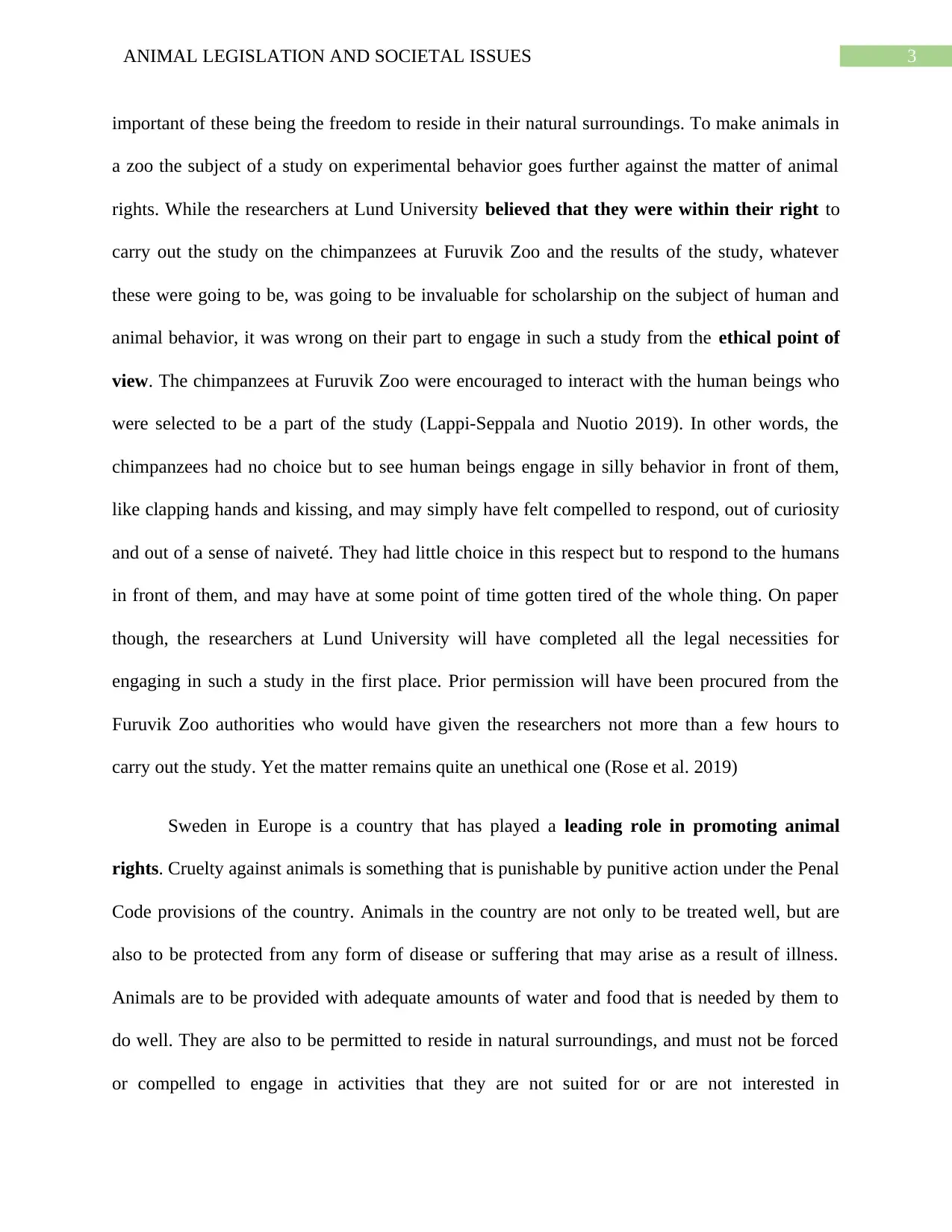
3ANIMAL LEGISLATION AND SOCIETAL ISSUES
important of these being the freedom to reside in their natural surroundings. To make animals in
a zoo the subject of a study on experimental behavior goes further against the matter of animal
rights. While the researchers at Lund University believed that they were within their right to
carry out the study on the chimpanzees at Furuvik Zoo and the results of the study, whatever
these were going to be, was going to be invaluable for scholarship on the subject of human and
animal behavior, it was wrong on their part to engage in such a study from the ethical point of
view. The chimpanzees at Furuvik Zoo were encouraged to interact with the human beings who
were selected to be a part of the study (Lappi-Seppala and Nuotio 2019). In other words, the
chimpanzees had no choice but to see human beings engage in silly behavior in front of them,
like clapping hands and kissing, and may simply have felt compelled to respond, out of curiosity
and out of a sense of naiveté. They had little choice in this respect but to respond to the humans
in front of them, and may have at some point of time gotten tired of the whole thing. On paper
though, the researchers at Lund University will have completed all the legal necessities for
engaging in such a study in the first place. Prior permission will have been procured from the
Furuvik Zoo authorities who would have given the researchers not more than a few hours to
carry out the study. Yet the matter remains quite an unethical one (Rose et al. 2019)
Sweden in Europe is a country that has played a leading role in promoting animal
rights. Cruelty against animals is something that is punishable by punitive action under the Penal
Code provisions of the country. Animals in the country are not only to be treated well, but are
also to be protected from any form of disease or suffering that may arise as a result of illness.
Animals are to be provided with adequate amounts of water and food that is needed by them to
do well. They are also to be permitted to reside in natural surroundings, and must not be forced
or compelled to engage in activities that they are not suited for or are not interested in
important of these being the freedom to reside in their natural surroundings. To make animals in
a zoo the subject of a study on experimental behavior goes further against the matter of animal
rights. While the researchers at Lund University believed that they were within their right to
carry out the study on the chimpanzees at Furuvik Zoo and the results of the study, whatever
these were going to be, was going to be invaluable for scholarship on the subject of human and
animal behavior, it was wrong on their part to engage in such a study from the ethical point of
view. The chimpanzees at Furuvik Zoo were encouraged to interact with the human beings who
were selected to be a part of the study (Lappi-Seppala and Nuotio 2019). In other words, the
chimpanzees had no choice but to see human beings engage in silly behavior in front of them,
like clapping hands and kissing, and may simply have felt compelled to respond, out of curiosity
and out of a sense of naiveté. They had little choice in this respect but to respond to the humans
in front of them, and may have at some point of time gotten tired of the whole thing. On paper
though, the researchers at Lund University will have completed all the legal necessities for
engaging in such a study in the first place. Prior permission will have been procured from the
Furuvik Zoo authorities who would have given the researchers not more than a few hours to
carry out the study. Yet the matter remains quite an unethical one (Rose et al. 2019)
Sweden in Europe is a country that has played a leading role in promoting animal
rights. Cruelty against animals is something that is punishable by punitive action under the Penal
Code provisions of the country. Animals in the country are not only to be treated well, but are
also to be protected from any form of disease or suffering that may arise as a result of illness.
Animals are to be provided with adequate amounts of water and food that is needed by them to
do well. They are also to be permitted to reside in natural surroundings, and must not be forced
or compelled to engage in activities that they are not suited for or are not interested in
Secure Best Marks with AI Grader
Need help grading? Try our AI Grader for instant feedback on your assignments.
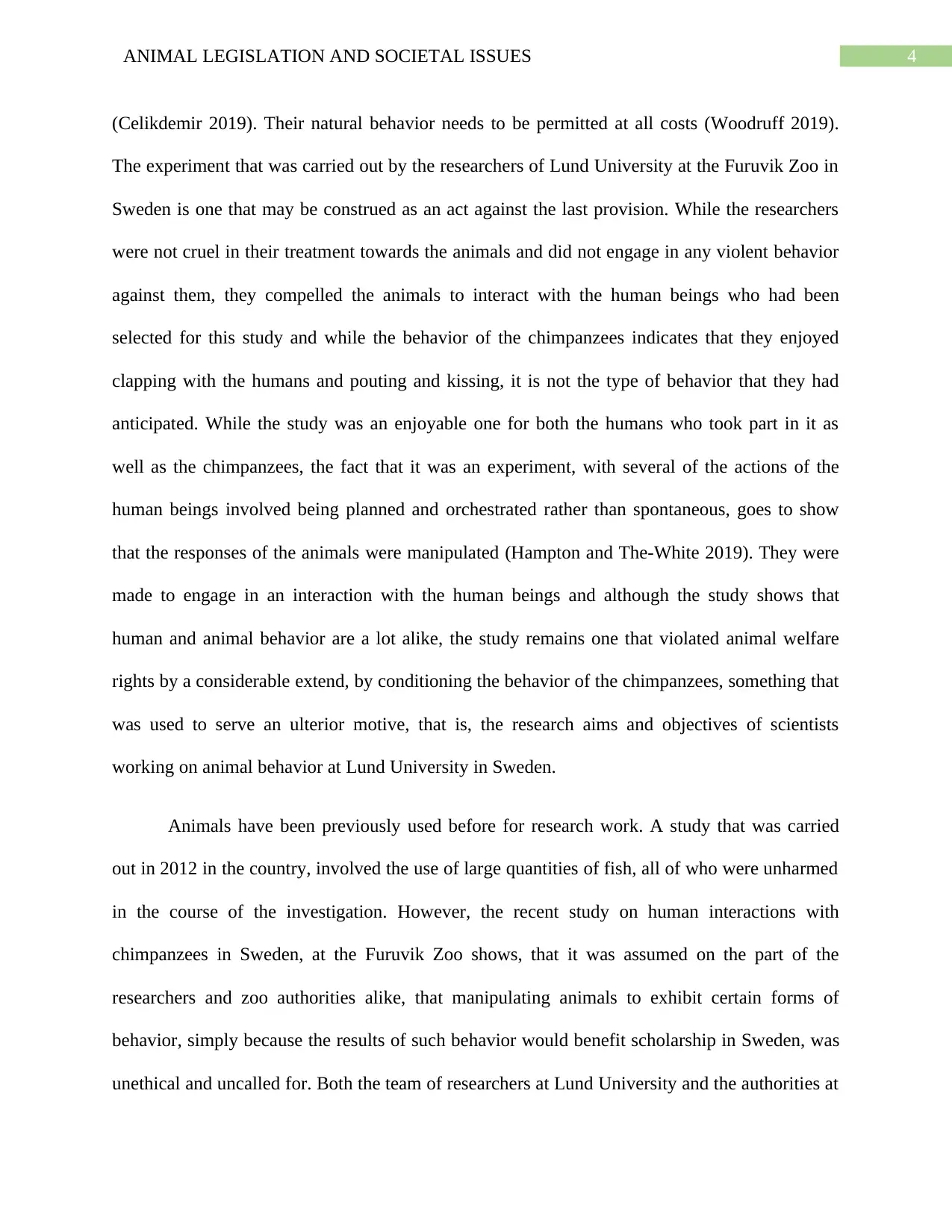
4ANIMAL LEGISLATION AND SOCIETAL ISSUES
(Celikdemir 2019). Their natural behavior needs to be permitted at all costs (Woodruff 2019).
The experiment that was carried out by the researchers of Lund University at the Furuvik Zoo in
Sweden is one that may be construed as an act against the last provision. While the researchers
were not cruel in their treatment towards the animals and did not engage in any violent behavior
against them, they compelled the animals to interact with the human beings who had been
selected for this study and while the behavior of the chimpanzees indicates that they enjoyed
clapping with the humans and pouting and kissing, it is not the type of behavior that they had
anticipated. While the study was an enjoyable one for both the humans who took part in it as
well as the chimpanzees, the fact that it was an experiment, with several of the actions of the
human beings involved being planned and orchestrated rather than spontaneous, goes to show
that the responses of the animals were manipulated (Hampton and The-White 2019). They were
made to engage in an interaction with the human beings and although the study shows that
human and animal behavior are a lot alike, the study remains one that violated animal welfare
rights by a considerable extend, by conditioning the behavior of the chimpanzees, something that
was used to serve an ulterior motive, that is, the research aims and objectives of scientists
working on animal behavior at Lund University in Sweden.
Animals have been previously used before for research work. A study that was carried
out in 2012 in the country, involved the use of large quantities of fish, all of who were unharmed
in the course of the investigation. However, the recent study on human interactions with
chimpanzees in Sweden, at the Furuvik Zoo shows, that it was assumed on the part of the
researchers and zoo authorities alike, that manipulating animals to exhibit certain forms of
behavior, simply because the results of such behavior would benefit scholarship in Sweden, was
unethical and uncalled for. Both the team of researchers at Lund University and the authorities at
(Celikdemir 2019). Their natural behavior needs to be permitted at all costs (Woodruff 2019).
The experiment that was carried out by the researchers of Lund University at the Furuvik Zoo in
Sweden is one that may be construed as an act against the last provision. While the researchers
were not cruel in their treatment towards the animals and did not engage in any violent behavior
against them, they compelled the animals to interact with the human beings who had been
selected for this study and while the behavior of the chimpanzees indicates that they enjoyed
clapping with the humans and pouting and kissing, it is not the type of behavior that they had
anticipated. While the study was an enjoyable one for both the humans who took part in it as
well as the chimpanzees, the fact that it was an experiment, with several of the actions of the
human beings involved being planned and orchestrated rather than spontaneous, goes to show
that the responses of the animals were manipulated (Hampton and The-White 2019). They were
made to engage in an interaction with the human beings and although the study shows that
human and animal behavior are a lot alike, the study remains one that violated animal welfare
rights by a considerable extend, by conditioning the behavior of the chimpanzees, something that
was used to serve an ulterior motive, that is, the research aims and objectives of scientists
working on animal behavior at Lund University in Sweden.
Animals have been previously used before for research work. A study that was carried
out in 2012 in the country, involved the use of large quantities of fish, all of who were unharmed
in the course of the investigation. However, the recent study on human interactions with
chimpanzees in Sweden, at the Furuvik Zoo shows, that it was assumed on the part of the
researchers and zoo authorities alike, that manipulating animals to exhibit certain forms of
behavior, simply because the results of such behavior would benefit scholarship in Sweden, was
unethical and uncalled for. Both the team of researchers at Lund University and the authorities at
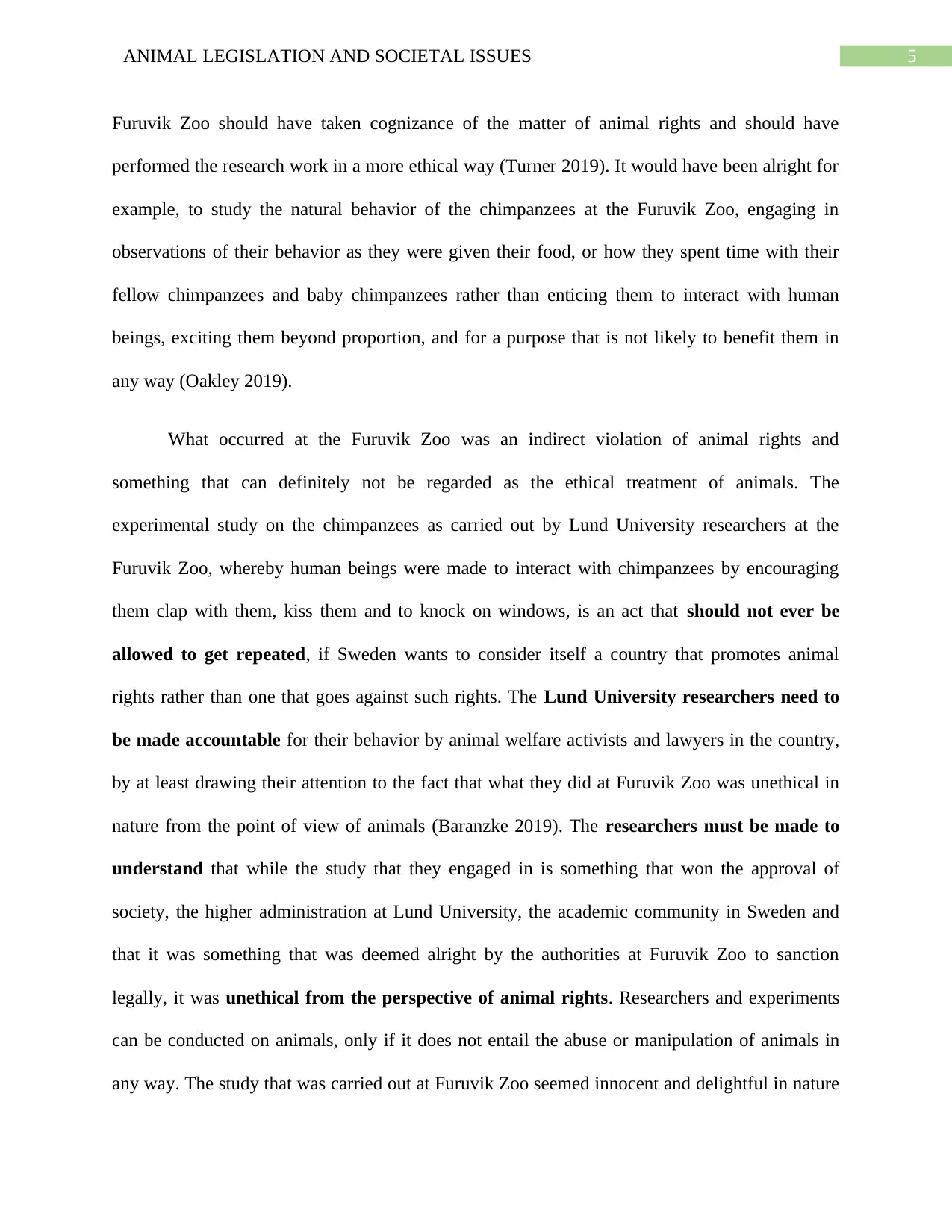
5ANIMAL LEGISLATION AND SOCIETAL ISSUES
Furuvik Zoo should have taken cognizance of the matter of animal rights and should have
performed the research work in a more ethical way (Turner 2019). It would have been alright for
example, to study the natural behavior of the chimpanzees at the Furuvik Zoo, engaging in
observations of their behavior as they were given their food, or how they spent time with their
fellow chimpanzees and baby chimpanzees rather than enticing them to interact with human
beings, exciting them beyond proportion, and for a purpose that is not likely to benefit them in
any way (Oakley 2019).
What occurred at the Furuvik Zoo was an indirect violation of animal rights and
something that can definitely not be regarded as the ethical treatment of animals. The
experimental study on the chimpanzees as carried out by Lund University researchers at the
Furuvik Zoo, whereby human beings were made to interact with chimpanzees by encouraging
them clap with them, kiss them and to knock on windows, is an act that should not ever be
allowed to get repeated, if Sweden wants to consider itself a country that promotes animal
rights rather than one that goes against such rights. The Lund University researchers need to
be made accountable for their behavior by animal welfare activists and lawyers in the country,
by at least drawing their attention to the fact that what they did at Furuvik Zoo was unethical in
nature from the point of view of animals (Baranzke 2019). The researchers must be made to
understand that while the study that they engaged in is something that won the approval of
society, the higher administration at Lund University, the academic community in Sweden and
that it was something that was deemed alright by the authorities at Furuvik Zoo to sanction
legally, it was unethical from the perspective of animal rights. Researchers and experiments
can be conducted on animals, only if it does not entail the abuse or manipulation of animals in
any way. The study that was carried out at Furuvik Zoo seemed innocent and delightful in nature
Furuvik Zoo should have taken cognizance of the matter of animal rights and should have
performed the research work in a more ethical way (Turner 2019). It would have been alright for
example, to study the natural behavior of the chimpanzees at the Furuvik Zoo, engaging in
observations of their behavior as they were given their food, or how they spent time with their
fellow chimpanzees and baby chimpanzees rather than enticing them to interact with human
beings, exciting them beyond proportion, and for a purpose that is not likely to benefit them in
any way (Oakley 2019).
What occurred at the Furuvik Zoo was an indirect violation of animal rights and
something that can definitely not be regarded as the ethical treatment of animals. The
experimental study on the chimpanzees as carried out by Lund University researchers at the
Furuvik Zoo, whereby human beings were made to interact with chimpanzees by encouraging
them clap with them, kiss them and to knock on windows, is an act that should not ever be
allowed to get repeated, if Sweden wants to consider itself a country that promotes animal
rights rather than one that goes against such rights. The Lund University researchers need to
be made accountable for their behavior by animal welfare activists and lawyers in the country,
by at least drawing their attention to the fact that what they did at Furuvik Zoo was unethical in
nature from the point of view of animals (Baranzke 2019). The researchers must be made to
understand that while the study that they engaged in is something that won the approval of
society, the higher administration at Lund University, the academic community in Sweden and
that it was something that was deemed alright by the authorities at Furuvik Zoo to sanction
legally, it was unethical from the perspective of animal rights. Researchers and experiments
can be conducted on animals, only if it does not entail the abuse or manipulation of animals in
any way. The study that was carried out at Furuvik Zoo seemed innocent and delightful in nature
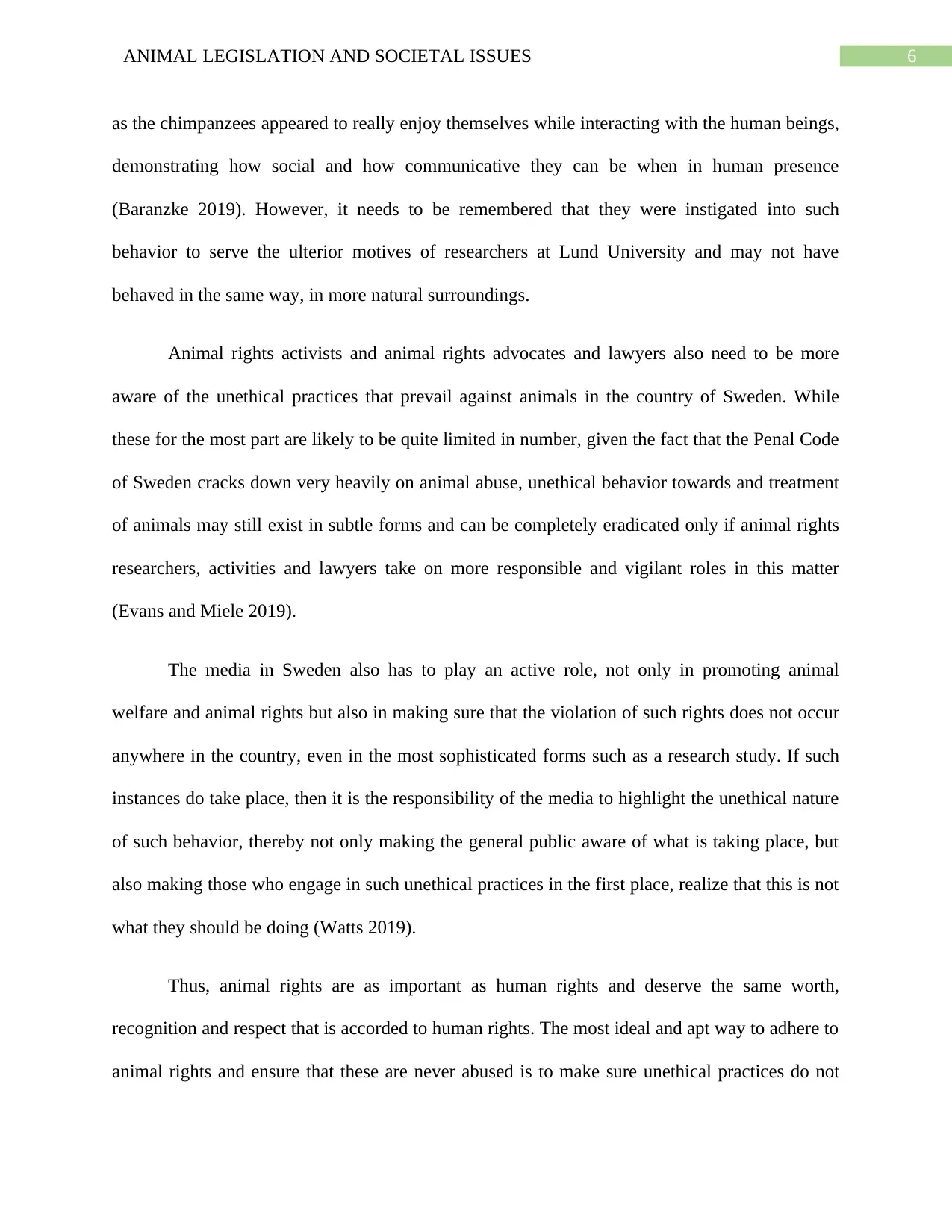
6ANIMAL LEGISLATION AND SOCIETAL ISSUES
as the chimpanzees appeared to really enjoy themselves while interacting with the human beings,
demonstrating how social and how communicative they can be when in human presence
(Baranzke 2019). However, it needs to be remembered that they were instigated into such
behavior to serve the ulterior motives of researchers at Lund University and may not have
behaved in the same way, in more natural surroundings.
Animal rights activists and animal rights advocates and lawyers also need to be more
aware of the unethical practices that prevail against animals in the country of Sweden. While
these for the most part are likely to be quite limited in number, given the fact that the Penal Code
of Sweden cracks down very heavily on animal abuse, unethical behavior towards and treatment
of animals may still exist in subtle forms and can be completely eradicated only if animal rights
researchers, activities and lawyers take on more responsible and vigilant roles in this matter
(Evans and Miele 2019).
The media in Sweden also has to play an active role, not only in promoting animal
welfare and animal rights but also in making sure that the violation of such rights does not occur
anywhere in the country, even in the most sophisticated forms such as a research study. If such
instances do take place, then it is the responsibility of the media to highlight the unethical nature
of such behavior, thereby not only making the general public aware of what is taking place, but
also making those who engage in such unethical practices in the first place, realize that this is not
what they should be doing (Watts 2019).
Thus, animal rights are as important as human rights and deserve the same worth,
recognition and respect that is accorded to human rights. The most ideal and apt way to adhere to
animal rights and ensure that these are never abused is to make sure unethical practices do not
as the chimpanzees appeared to really enjoy themselves while interacting with the human beings,
demonstrating how social and how communicative they can be when in human presence
(Baranzke 2019). However, it needs to be remembered that they were instigated into such
behavior to serve the ulterior motives of researchers at Lund University and may not have
behaved in the same way, in more natural surroundings.
Animal rights activists and animal rights advocates and lawyers also need to be more
aware of the unethical practices that prevail against animals in the country of Sweden. While
these for the most part are likely to be quite limited in number, given the fact that the Penal Code
of Sweden cracks down very heavily on animal abuse, unethical behavior towards and treatment
of animals may still exist in subtle forms and can be completely eradicated only if animal rights
researchers, activities and lawyers take on more responsible and vigilant roles in this matter
(Evans and Miele 2019).
The media in Sweden also has to play an active role, not only in promoting animal
welfare and animal rights but also in making sure that the violation of such rights does not occur
anywhere in the country, even in the most sophisticated forms such as a research study. If such
instances do take place, then it is the responsibility of the media to highlight the unethical nature
of such behavior, thereby not only making the general public aware of what is taking place, but
also making those who engage in such unethical practices in the first place, realize that this is not
what they should be doing (Watts 2019).
Thus, animal rights are as important as human rights and deserve the same worth,
recognition and respect that is accorded to human rights. The most ideal and apt way to adhere to
animal rights and ensure that these are never abused is to make sure unethical practices do not
Paraphrase This Document
Need a fresh take? Get an instant paraphrase of this document with our AI Paraphraser
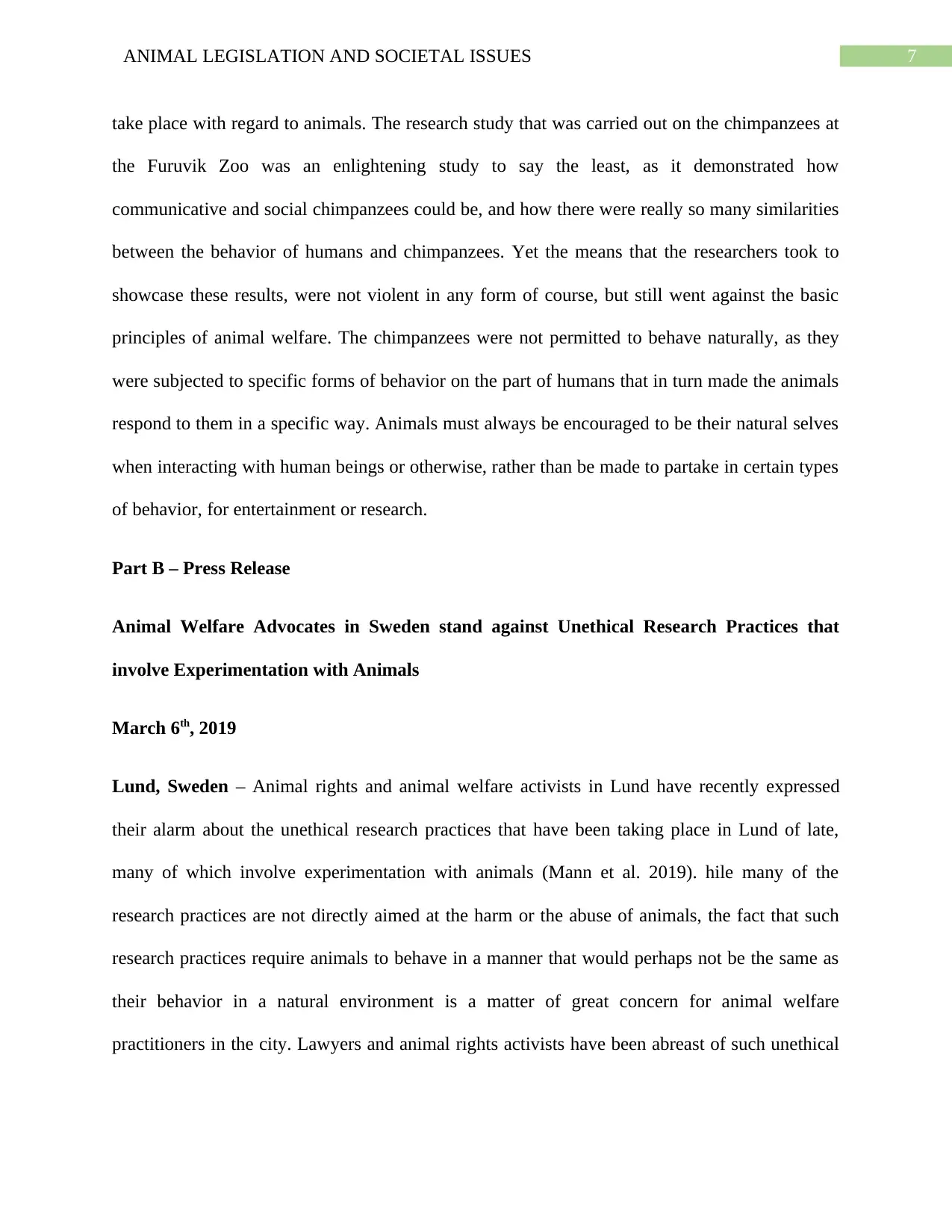
7ANIMAL LEGISLATION AND SOCIETAL ISSUES
take place with regard to animals. The research study that was carried out on the chimpanzees at
the Furuvik Zoo was an enlightening study to say the least, as it demonstrated how
communicative and social chimpanzees could be, and how there were really so many similarities
between the behavior of humans and chimpanzees. Yet the means that the researchers took to
showcase these results, were not violent in any form of course, but still went against the basic
principles of animal welfare. The chimpanzees were not permitted to behave naturally, as they
were subjected to specific forms of behavior on the part of humans that in turn made the animals
respond to them in a specific way. Animals must always be encouraged to be their natural selves
when interacting with human beings or otherwise, rather than be made to partake in certain types
of behavior, for entertainment or research.
Part B – Press Release
Animal Welfare Advocates in Sweden stand against Unethical Research Practices that
involve Experimentation with Animals
March 6th, 2019
Lund, Sweden – Animal rights and animal welfare activists in Lund have recently expressed
their alarm about the unethical research practices that have been taking place in Lund of late,
many of which involve experimentation with animals (Mann et al. 2019). hile many of the
research practices are not directly aimed at the harm or the abuse of animals, the fact that such
research practices require animals to behave in a manner that would perhaps not be the same as
their behavior in a natural environment is a matter of great concern for animal welfare
practitioners in the city. Lawyers and animal rights activists have been abreast of such unethical
take place with regard to animals. The research study that was carried out on the chimpanzees at
the Furuvik Zoo was an enlightening study to say the least, as it demonstrated how
communicative and social chimpanzees could be, and how there were really so many similarities
between the behavior of humans and chimpanzees. Yet the means that the researchers took to
showcase these results, were not violent in any form of course, but still went against the basic
principles of animal welfare. The chimpanzees were not permitted to behave naturally, as they
were subjected to specific forms of behavior on the part of humans that in turn made the animals
respond to them in a specific way. Animals must always be encouraged to be their natural selves
when interacting with human beings or otherwise, rather than be made to partake in certain types
of behavior, for entertainment or research.
Part B – Press Release
Animal Welfare Advocates in Sweden stand against Unethical Research Practices that
involve Experimentation with Animals
March 6th, 2019
Lund, Sweden – Animal rights and animal welfare activists in Lund have recently expressed
their alarm about the unethical research practices that have been taking place in Lund of late,
many of which involve experimentation with animals (Mann et al. 2019). hile many of the
research practices are not directly aimed at the harm or the abuse of animals, the fact that such
research practices require animals to behave in a manner that would perhaps not be the same as
their behavior in a natural environment is a matter of great concern for animal welfare
practitioners in the city. Lawyers and animal rights activists have been abreast of such unethical
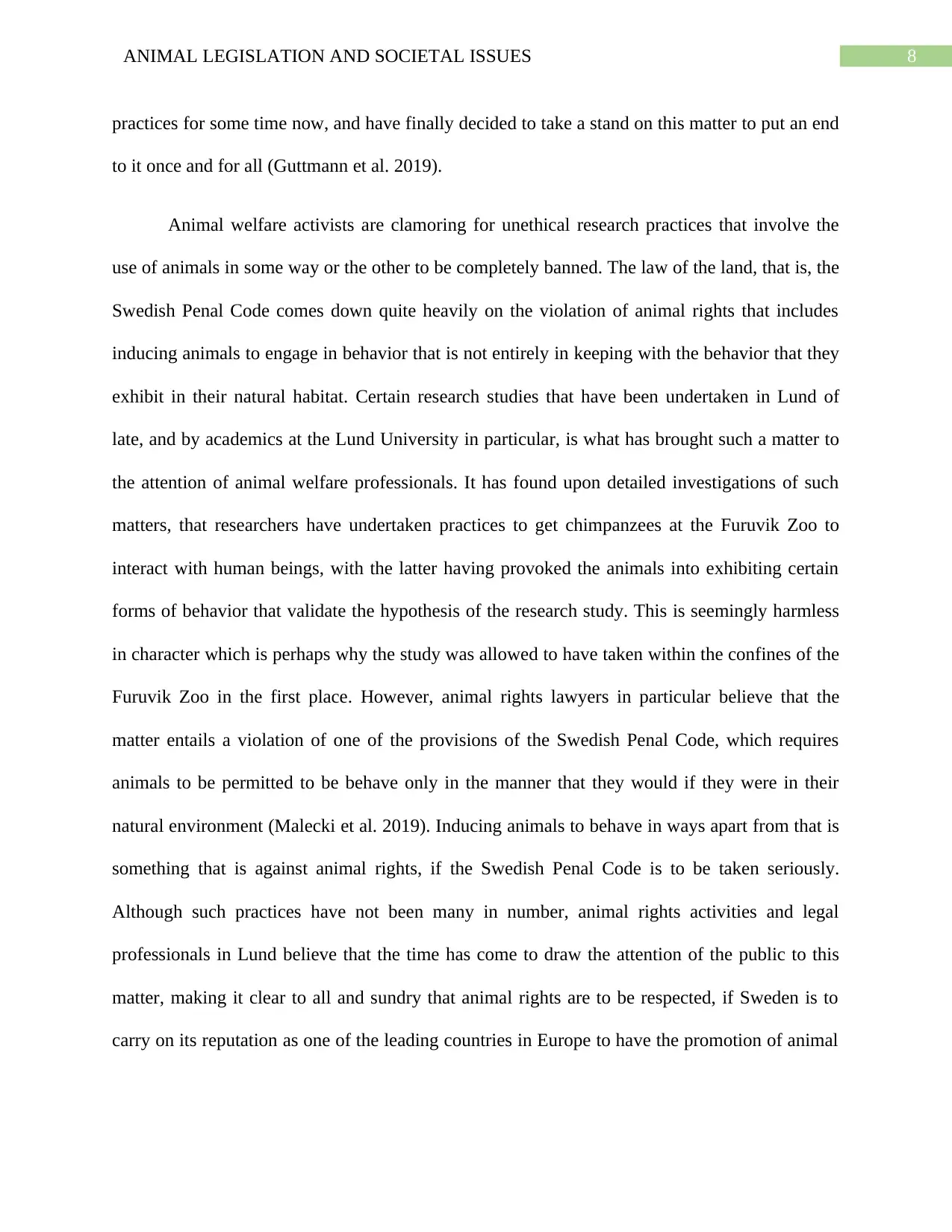
8ANIMAL LEGISLATION AND SOCIETAL ISSUES
practices for some time now, and have finally decided to take a stand on this matter to put an end
to it once and for all (Guttmann et al. 2019).
Animal welfare activists are clamoring for unethical research practices that involve the
use of animals in some way or the other to be completely banned. The law of the land, that is, the
Swedish Penal Code comes down quite heavily on the violation of animal rights that includes
inducing animals to engage in behavior that is not entirely in keeping with the behavior that they
exhibit in their natural habitat. Certain research studies that have been undertaken in Lund of
late, and by academics at the Lund University in particular, is what has brought such a matter to
the attention of animal welfare professionals. It has found upon detailed investigations of such
matters, that researchers have undertaken practices to get chimpanzees at the Furuvik Zoo to
interact with human beings, with the latter having provoked the animals into exhibiting certain
forms of behavior that validate the hypothesis of the research study. This is seemingly harmless
in character which is perhaps why the study was allowed to have taken within the confines of the
Furuvik Zoo in the first place. However, animal rights lawyers in particular believe that the
matter entails a violation of one of the provisions of the Swedish Penal Code, which requires
animals to be permitted to be behave only in the manner that they would if they were in their
natural environment (Malecki et al. 2019). Inducing animals to behave in ways apart from that is
something that is against animal rights, if the Swedish Penal Code is to be taken seriously.
Although such practices have not been many in number, animal rights activities and legal
professionals in Lund believe that the time has come to draw the attention of the public to this
matter, making it clear to all and sundry that animal rights are to be respected, if Sweden is to
carry on its reputation as one of the leading countries in Europe to have the promotion of animal
practices for some time now, and have finally decided to take a stand on this matter to put an end
to it once and for all (Guttmann et al. 2019).
Animal welfare activists are clamoring for unethical research practices that involve the
use of animals in some way or the other to be completely banned. The law of the land, that is, the
Swedish Penal Code comes down quite heavily on the violation of animal rights that includes
inducing animals to engage in behavior that is not entirely in keeping with the behavior that they
exhibit in their natural habitat. Certain research studies that have been undertaken in Lund of
late, and by academics at the Lund University in particular, is what has brought such a matter to
the attention of animal welfare professionals. It has found upon detailed investigations of such
matters, that researchers have undertaken practices to get chimpanzees at the Furuvik Zoo to
interact with human beings, with the latter having provoked the animals into exhibiting certain
forms of behavior that validate the hypothesis of the research study. This is seemingly harmless
in character which is perhaps why the study was allowed to have taken within the confines of the
Furuvik Zoo in the first place. However, animal rights lawyers in particular believe that the
matter entails a violation of one of the provisions of the Swedish Penal Code, which requires
animals to be permitted to be behave only in the manner that they would if they were in their
natural environment (Malecki et al. 2019). Inducing animals to behave in ways apart from that is
something that is against animal rights, if the Swedish Penal Code is to be taken seriously.
Although such practices have not been many in number, animal rights activities and legal
professionals in Lund believe that the time has come to draw the attention of the public to this
matter, making it clear to all and sundry that animal rights are to be respected, if Sweden is to
carry on its reputation as one of the leading countries in Europe to have the promotion of animal
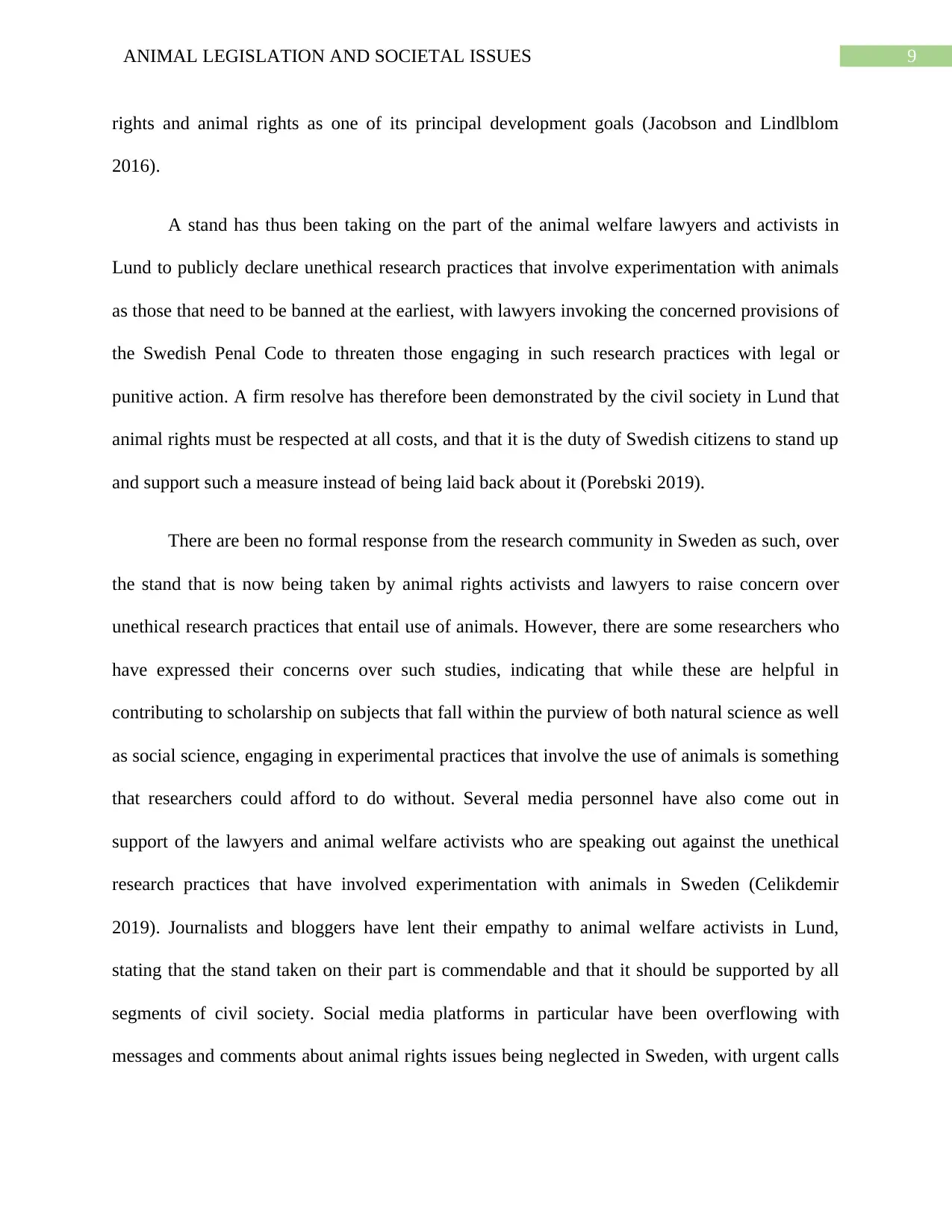
9ANIMAL LEGISLATION AND SOCIETAL ISSUES
rights and animal rights as one of its principal development goals (Jacobson and Lindlblom
2016).
A stand has thus been taking on the part of the animal welfare lawyers and activists in
Lund to publicly declare unethical research practices that involve experimentation with animals
as those that need to be banned at the earliest, with lawyers invoking the concerned provisions of
the Swedish Penal Code to threaten those engaging in such research practices with legal or
punitive action. A firm resolve has therefore been demonstrated by the civil society in Lund that
animal rights must be respected at all costs, and that it is the duty of Swedish citizens to stand up
and support such a measure instead of being laid back about it (Porebski 2019).
There are been no formal response from the research community in Sweden as such, over
the stand that is now being taken by animal rights activists and lawyers to raise concern over
unethical research practices that entail use of animals. However, there are some researchers who
have expressed their concerns over such studies, indicating that while these are helpful in
contributing to scholarship on subjects that fall within the purview of both natural science as well
as social science, engaging in experimental practices that involve the use of animals is something
that researchers could afford to do without. Several media personnel have also come out in
support of the lawyers and animal welfare activists who are speaking out against the unethical
research practices that have involved experimentation with animals in Sweden (Celikdemir
2019). Journalists and bloggers have lent their empathy to animal welfare activists in Lund,
stating that the stand taken on their part is commendable and that it should be supported by all
segments of civil society. Social media platforms in particular have been overflowing with
messages and comments about animal rights issues being neglected in Sweden, with urgent calls
rights and animal rights as one of its principal development goals (Jacobson and Lindlblom
2016).
A stand has thus been taking on the part of the animal welfare lawyers and activists in
Lund to publicly declare unethical research practices that involve experimentation with animals
as those that need to be banned at the earliest, with lawyers invoking the concerned provisions of
the Swedish Penal Code to threaten those engaging in such research practices with legal or
punitive action. A firm resolve has therefore been demonstrated by the civil society in Lund that
animal rights must be respected at all costs, and that it is the duty of Swedish citizens to stand up
and support such a measure instead of being laid back about it (Porebski 2019).
There are been no formal response from the research community in Sweden as such, over
the stand that is now being taken by animal rights activists and lawyers to raise concern over
unethical research practices that entail use of animals. However, there are some researchers who
have expressed their concerns over such studies, indicating that while these are helpful in
contributing to scholarship on subjects that fall within the purview of both natural science as well
as social science, engaging in experimental practices that involve the use of animals is something
that researchers could afford to do without. Several media personnel have also come out in
support of the lawyers and animal welfare activists who are speaking out against the unethical
research practices that have involved experimentation with animals in Sweden (Celikdemir
2019). Journalists and bloggers have lent their empathy to animal welfare activists in Lund,
stating that the stand taken on their part is commendable and that it should be supported by all
segments of civil society. Social media platforms in particular have been overflowing with
messages and comments about animal rights issues being neglected in Sweden, with urgent calls
Secure Best Marks with AI Grader
Need help grading? Try our AI Grader for instant feedback on your assignments.

10ANIMAL LEGISLATION AND SOCIETAL ISSUES
for measures to be taken to ensure that this no longer remains the case. (Jacobson and Lindlblom
2016).
for measures to be taken to ensure that this no longer remains the case. (Jacobson and Lindlblom
2016).
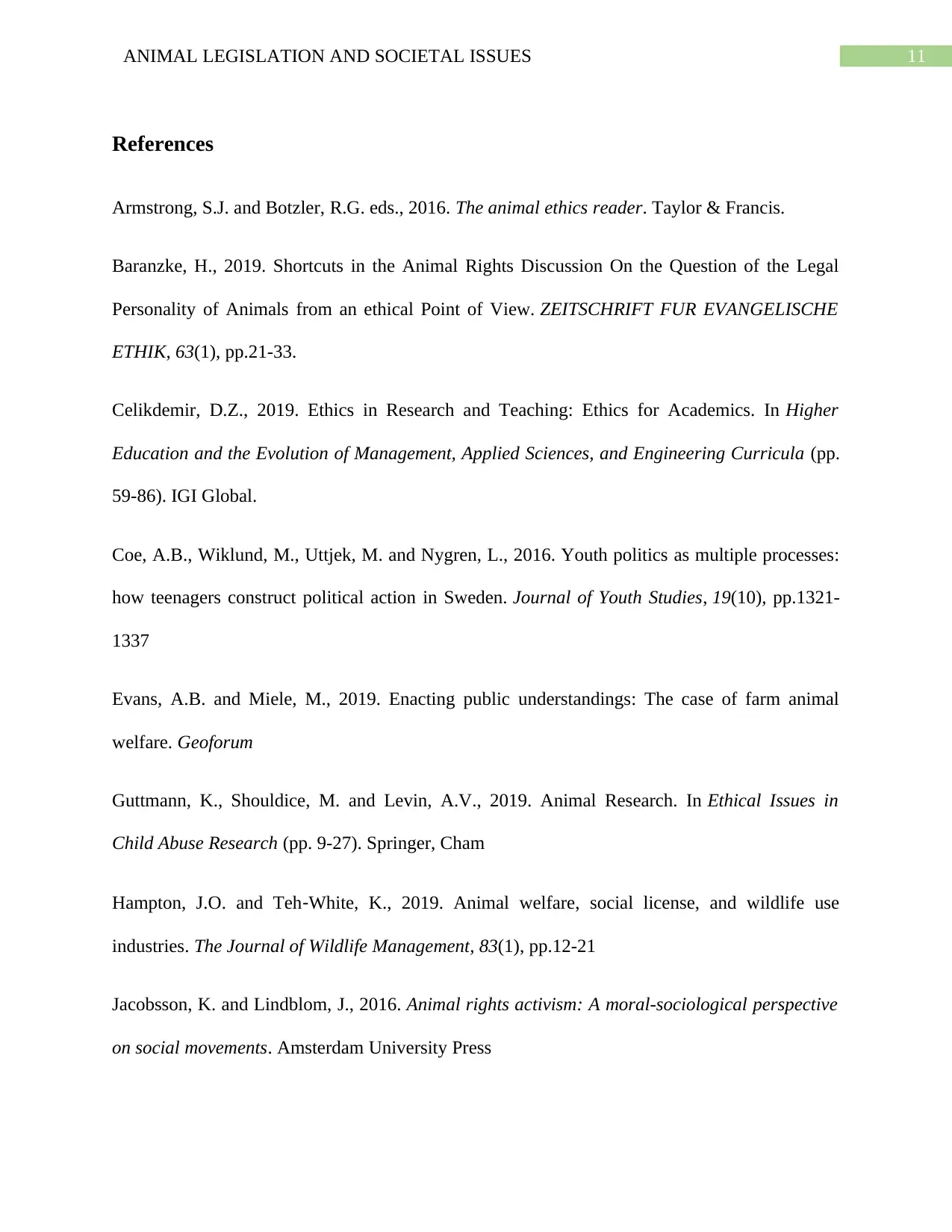
11ANIMAL LEGISLATION AND SOCIETAL ISSUES
References
Armstrong, S.J. and Botzler, R.G. eds., 2016. The animal ethics reader. Taylor & Francis.
Baranzke, H., 2019. Shortcuts in the Animal Rights Discussion On the Question of the Legal
Personality of Animals from an ethical Point of View. ZEITSCHRIFT FUR EVANGELISCHE
ETHIK, 63(1), pp.21-33.
Celikdemir, D.Z., 2019. Ethics in Research and Teaching: Ethics for Academics. In Higher
Education and the Evolution of Management, Applied Sciences, and Engineering Curricula (pp.
59-86). IGI Global.
Coe, A.B., Wiklund, M., Uttjek, M. and Nygren, L., 2016. Youth politics as multiple processes:
how teenagers construct political action in Sweden. Journal of Youth Studies, 19(10), pp.1321-
1337
Evans, A.B. and Miele, M., 2019. Enacting public understandings: The case of farm animal
welfare. Geoforum
Guttmann, K., Shouldice, M. and Levin, A.V., 2019. Animal Research. In Ethical Issues in
Child Abuse Research (pp. 9-27). Springer, Cham
Hampton, J.O. and Teh‐White, K., 2019. Animal welfare, social license, and wildlife use
industries. The Journal of Wildlife Management, 83(1), pp.12-21
Jacobsson, K. and Lindblom, J., 2016. Animal rights activism: A moral-sociological perspective
on social movements. Amsterdam University Press
References
Armstrong, S.J. and Botzler, R.G. eds., 2016. The animal ethics reader. Taylor & Francis.
Baranzke, H., 2019. Shortcuts in the Animal Rights Discussion On the Question of the Legal
Personality of Animals from an ethical Point of View. ZEITSCHRIFT FUR EVANGELISCHE
ETHIK, 63(1), pp.21-33.
Celikdemir, D.Z., 2019. Ethics in Research and Teaching: Ethics for Academics. In Higher
Education and the Evolution of Management, Applied Sciences, and Engineering Curricula (pp.
59-86). IGI Global.
Coe, A.B., Wiklund, M., Uttjek, M. and Nygren, L., 2016. Youth politics as multiple processes:
how teenagers construct political action in Sweden. Journal of Youth Studies, 19(10), pp.1321-
1337
Evans, A.B. and Miele, M., 2019. Enacting public understandings: The case of farm animal
welfare. Geoforum
Guttmann, K., Shouldice, M. and Levin, A.V., 2019. Animal Research. In Ethical Issues in
Child Abuse Research (pp. 9-27). Springer, Cham
Hampton, J.O. and Teh‐White, K., 2019. Animal welfare, social license, and wildlife use
industries. The Journal of Wildlife Management, 83(1), pp.12-21
Jacobsson, K. and Lindblom, J., 2016. Animal rights activism: A moral-sociological perspective
on social movements. Amsterdam University Press
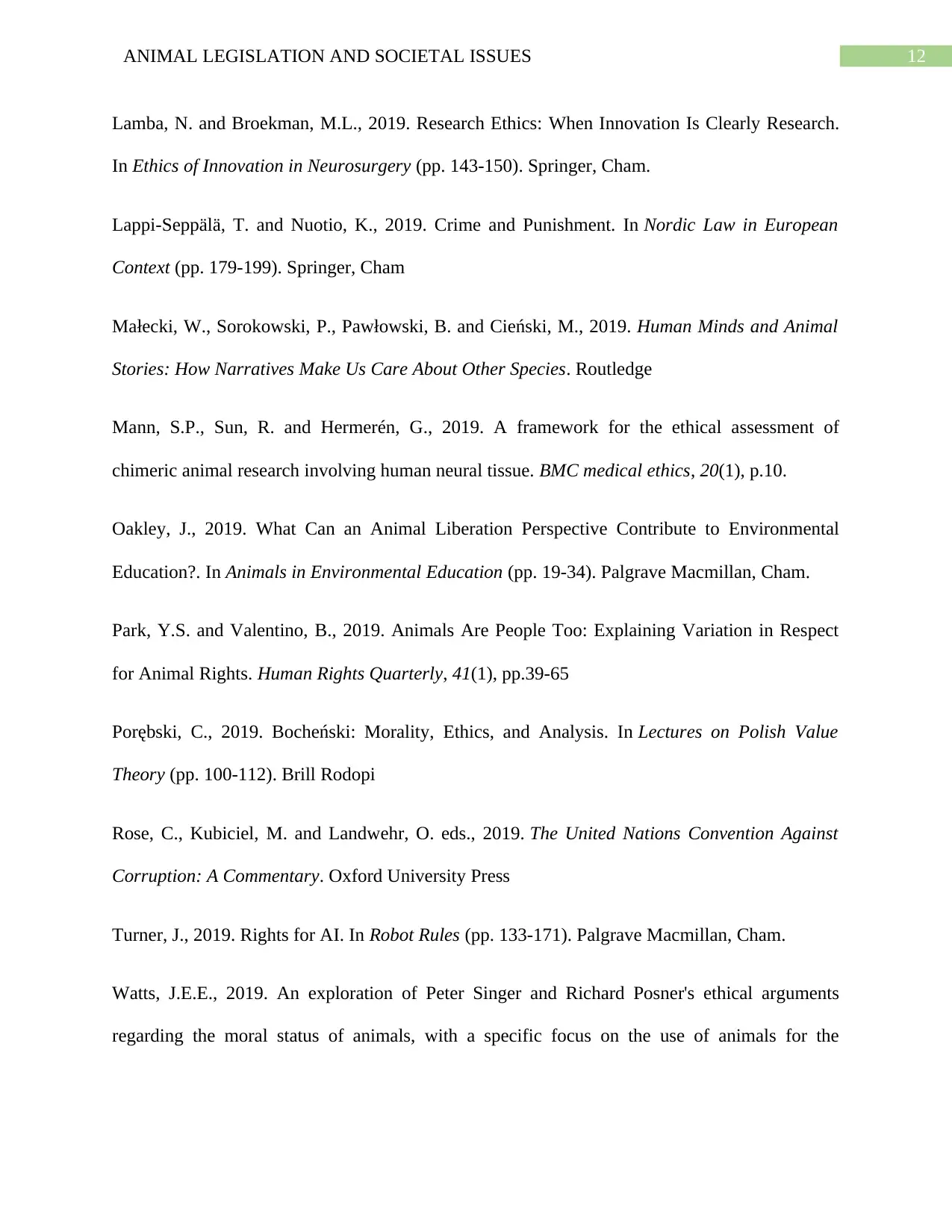
12ANIMAL LEGISLATION AND SOCIETAL ISSUES
Lamba, N. and Broekman, M.L., 2019. Research Ethics: When Innovation Is Clearly Research.
In Ethics of Innovation in Neurosurgery (pp. 143-150). Springer, Cham.
Lappi-Seppälä, T. and Nuotio, K., 2019. Crime and Punishment. In Nordic Law in European
Context (pp. 179-199). Springer, Cham
Małecki, W., Sorokowski, P., Pawłowski, B. and Cieński, M., 2019. Human Minds and Animal
Stories: How Narratives Make Us Care About Other Species. Routledge
Mann, S.P., Sun, R. and Hermerén, G., 2019. A framework for the ethical assessment of
chimeric animal research involving human neural tissue. BMC medical ethics, 20(1), p.10.
Oakley, J., 2019. What Can an Animal Liberation Perspective Contribute to Environmental
Education?. In Animals in Environmental Education (pp. 19-34). Palgrave Macmillan, Cham.
Park, Y.S. and Valentino, B., 2019. Animals Are People Too: Explaining Variation in Respect
for Animal Rights. Human Rights Quarterly, 41(1), pp.39-65
Porębski, C., 2019. Bocheński: Morality, Ethics, and Analysis. In Lectures on Polish Value
Theory (pp. 100-112). Brill Rodopi
Rose, C., Kubiciel, M. and Landwehr, O. eds., 2019. The United Nations Convention Against
Corruption: A Commentary. Oxford University Press
Turner, J., 2019. Rights for AI. In Robot Rules (pp. 133-171). Palgrave Macmillan, Cham.
Watts, J.E.E., 2019. An exploration of Peter Singer and Richard Posner's ethical arguments
regarding the moral status of animals, with a specific focus on the use of animals for the
Lamba, N. and Broekman, M.L., 2019. Research Ethics: When Innovation Is Clearly Research.
In Ethics of Innovation in Neurosurgery (pp. 143-150). Springer, Cham.
Lappi-Seppälä, T. and Nuotio, K., 2019. Crime and Punishment. In Nordic Law in European
Context (pp. 179-199). Springer, Cham
Małecki, W., Sorokowski, P., Pawłowski, B. and Cieński, M., 2019. Human Minds and Animal
Stories: How Narratives Make Us Care About Other Species. Routledge
Mann, S.P., Sun, R. and Hermerén, G., 2019. A framework for the ethical assessment of
chimeric animal research involving human neural tissue. BMC medical ethics, 20(1), p.10.
Oakley, J., 2019. What Can an Animal Liberation Perspective Contribute to Environmental
Education?. In Animals in Environmental Education (pp. 19-34). Palgrave Macmillan, Cham.
Park, Y.S. and Valentino, B., 2019. Animals Are People Too: Explaining Variation in Respect
for Animal Rights. Human Rights Quarterly, 41(1), pp.39-65
Porębski, C., 2019. Bocheński: Morality, Ethics, and Analysis. In Lectures on Polish Value
Theory (pp. 100-112). Brill Rodopi
Rose, C., Kubiciel, M. and Landwehr, O. eds., 2019. The United Nations Convention Against
Corruption: A Commentary. Oxford University Press
Turner, J., 2019. Rights for AI. In Robot Rules (pp. 133-171). Palgrave Macmillan, Cham.
Watts, J.E.E., 2019. An exploration of Peter Singer and Richard Posner's ethical arguments
regarding the moral status of animals, with a specific focus on the use of animals for the
Paraphrase This Document
Need a fresh take? Get an instant paraphrase of this document with our AI Paraphraser
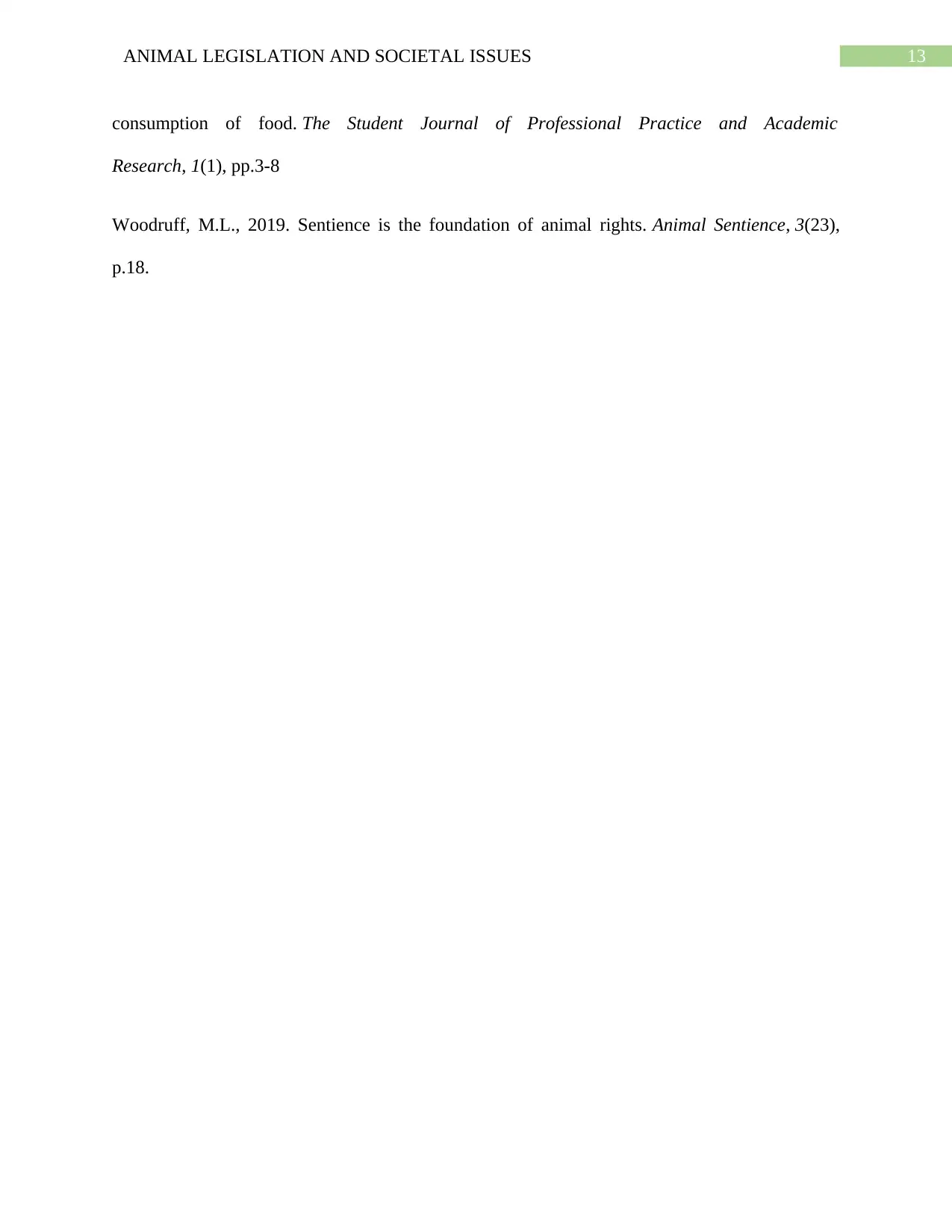
13ANIMAL LEGISLATION AND SOCIETAL ISSUES
consumption of food. The Student Journal of Professional Practice and Academic
Research, 1(1), pp.3-8
Woodruff, M.L., 2019. Sentience is the foundation of animal rights. Animal Sentience, 3(23),
p.18.
consumption of food. The Student Journal of Professional Practice and Academic
Research, 1(1), pp.3-8
Woodruff, M.L., 2019. Sentience is the foundation of animal rights. Animal Sentience, 3(23),
p.18.
1 out of 14
Related Documents
Your All-in-One AI-Powered Toolkit for Academic Success.
+13062052269
info@desklib.com
Available 24*7 on WhatsApp / Email
![[object Object]](/_next/static/media/star-bottom.7253800d.svg)
Unlock your academic potential
© 2024 | Zucol Services PVT LTD | All rights reserved.





